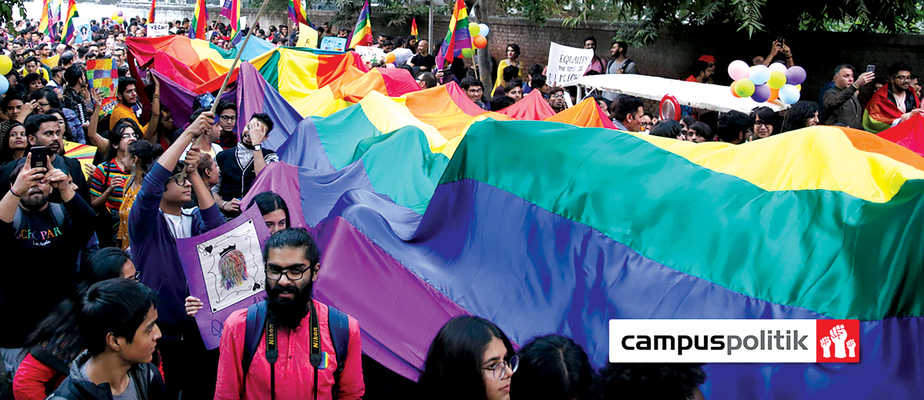
The university is envisioned to encourage free thinking and open exchange of ideas. But in India, the LGBTQ+ community feels that they don’t enjoy these rights on campuses.
The Supreme Court last year decriminalised homosexuality by striking down Article 377 of the constitution. The judgement sparked celebrations and pride parades across the country.
At Delhi University, student organisations such as Akhil Bharatiya Vidyarthi Parishad and the National Students’ Union of India promised, in their manifestos for students union election, to introduce reservations for the LGBTQ+ community in hostels.
At the same time, however, there were attempts to curtail the community’s freedom of expression. At Delhi’s Ambedkar University, the Azaadi Wall, also known as the Wall of Dissent, was demolished by the administration, on the October 1, 2019. The wall had pro-LGBTQIA graffiti. The administration claimed to remove the wall, and other graffiti’s surround the university campus for whitewashing.
It wasn’t the first time Ambedkar University had sought to undermine a space for the LGBTQ+ community. The university also had a Trans Memorial Wall, which commemorates transgender people in India. The wall has seen repeated vandalism by handbills and pamphlets by unidentified people.
It’s of a pattern.In 2018, At Delhi’s Jesus and Mary College, the administration refused to allow students to form a queer collective – on the grounds that the campus was “apolitical” – forcing them to operate outside the college campus and in a discreet manner.
Newslaundry spoke to a few students from the LGBTQ+ community about their experiences in the university space. Here’s what they had to say:
“We don’t talk about our identity in front of other students and faculty members for fear of being outed,” says Rishi Raj, a student and queer activist. “I won’t call the administration ‘queer-friendly’ but rather ‘queer-tolerant’. When we went to the administration to formalise the queer collective, they denied us permission saying the campus was ‘apolitical’.”
Kumaresh Ramesh, who is with Saathi, the queer collective at IIT Bombay, says, “Our journey hasn’t been smooth, but on the whole, the administration’s support for us has grown over the years. We believe there is a lot of scope for the administration to explicitly flag and address issues towards the community, such as casual queerphobia, gender neutral bathrooms.”
Soumya Jayanti of the Ambedkar University Delhi Queer Collective says, “The definition of what constitutes ‘queer friendly’ would, for obvious reasons, vary according to who is responding to the question. For the administration, perhaps, taking no part in actively promoting/encouraging/helping queer voices raise awareness on and around queer issues and demands, while parallelly ‘allowing’ the existence of queer politics on campus would constitute being ‘queer-friendly’.”
She adds, “However, for queer collectives on campus, active support/allyship in the form of enthusiastic support, funding, and formalisation on terms set by the members of the collective would mean that they were extended a ‘queer-friendly’ safe space by the administration.”
What are the challenges on campus? “We haven’t faced any opposition from the administration but we have faced passive queer-phobia from students sometimes,” claims Shruti Saunik of Ambar, of the IIT Kharagpur queer collective.
Members of the queer community at Ramanujan College in Delhi say the student body “seems welcoming now” but they expect “obstacles to come our way as we become more visible” on the campus.
“Initially, we were criticised by people. One of the things being said was, ‘Why do you people even exist in premier institutes?’ The lack of awareness among students is the cause of such criticism,” says Rahul of Orenda, who is whith the IIT Gandhinagar queer collective.
Jayanti of Ambedkar University says, “Politics remains largely dominated by Savarna cis-hetero people. Moreover, other forms of aggression from the administration include the Azaadi Wall being taken down or the Trans Memorial Wall being covered with bills or certain right-wing groups vandalising our walls with hyper-nationalist slogans in an attempt to intimidate.”
Some students feel that in a country where public spaces are usually dominated by cis-hetero people, queer collectives need to become more inclusive of people of different gender and sexual identities as well as diverse caste and regional backgrounds. They feel that sex education and general awareness needs to evolve in educational spaces to ensure the community doesn’t face any ostracisation.
www.newslaundry.com
Youth shot dead by bike-borne attackers while returning from marriage function; police recover cartridges, begin…
Arunachal women allege racial slurs and humiliation by neighbours over repair work dispute; police register…
The magistrate said the probe reveals that multiple associates could be absconding, which could tamper…
The cylinder blast injured six police and fire personnel deployed at the house where a…
Multiple operational teams have been deployed to probe the case. Crime and Forensic Science Laboratory…
The initiative focused on a victim-centric approach and aimed at strengthening public trust through proactive…